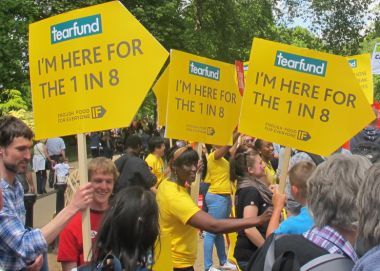We can't stay silent in the face of exploitation and injustice

It feels like it's our turn to take a beating.
Not Tearfund's turn alone, of course, but charities in general. Salaries of chief executives, including my own, were briefly in the news last summer, along with stories questioning the use of funds and calling for explanation about the ways humanitarian agencies serve the people of Syria.
Not that I'm complaining.
We campaign for transparency and are among those calling for more openness because we know that where there is secrecy, sin flourishes.
We see it in the Bible: when Bathsheba becomes pregnant by David, he panics and takes all sorts of increasingly drastic actions until eventually Bathsheba's husband is killed. David tries desperately to cover up the adultery and the consequences are tragic.
Yet he had many opportunities to disclose what had happened. By refusing to do so, and trying cover-up after cover-up, he gets into much more trouble.
In the same way, in all sorts of situations in every country of the world, keeping secrets means bad news for the most vulnerable people in society. Our work in some of the world's poorest countries has shown us this many times, like the mining companies which don't publish the payments they make to governments in the countries where they operate. The governments cover it up too and so, instead of using a legitimate tax system to fund basic infrastructure providing roads, schools and hospitals, a few people get rich on bribes while thousands of poor people struggle.
So I'm very happy for people to ask all sorts of questions about what we do and how we do it.
Sir Stephen Bubb says charities are facing the most hostile attitudes in a decade - read more here - and I do understand his concerns. He's right to point out that charities are the latest in a series of institutions to face public scrutiny, and to warn that our ability to campaign could be restricted as a result.
Because, while transparency and asking questions is fine, stopping us from telling the truth is not. And that's what restricting our campaigning would do.
Asking us to keep serving people and meeting their needs without allowing us to challenge the reasons for those needs is not the answer.
Archbishop Desmond Tutu is quoted as saying: "There comes a point where we need to stop just pulling people out of the river. We need to go upstream and find out why they're falling in."
Our job is of course to feed people who are hungry. But there's a reason they're hungry. In fact, there are lots of reasons, which vary from place to place, but there is absolutely no point in feeding, feeding, feeding and never solving the problems of food supply or affordability.
For hundreds of years, Christians have been among those bringing about the most immense changes for good. In the UK, church leaders helped lead campaigns to end child labour and slavery. Sadly, it's still happening in many places and our job is surely not only to rescue those who are exploited but also to help people to build strong families and earn a decent living so that they don't become so desperate they have to send their children away to work.
But those families can't support themselves unless they are able to earn a fair wage or have a safe water supply. Those things require infrastructure and a government to put it in place.
There are many things that need to change if we're going to live in a world where everyone has opportunities. Some of those things will only change with concerted action by businesses, governments or intergovernmental bodies like the UN, which is why we will not stop calling for those actions to be taken.
There is no logic or compassion in tackling the effects of poverty with no recognition of the cause. But that's what some people seem to think we should do.
Ironic then, that a call for transparency and truth-telling would turn out to be counter-productive. Muzzling those of us who speak with and for the most vulnerable people in the world is not transparency. Instead it is censorship and a huge threat to freedom.











